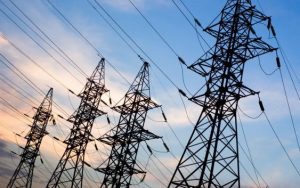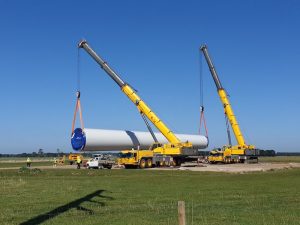The wind and solar industries are bracing for another verbal assault and an extended period of policy indifference from the federal government, after a senior Coalition MP likened renewable energy to “dole bludgers’, the government funnelled $4 million into a study for a new coal fired power station in Queensland, and so-called government “moderates” declared their support for nuclear.
Despite the plunging costs of solar, wind and storage, the war against renewables is accelerating dramatically as the government comes under pressure to improve its climate policies, and even consider re-instating the long term zero carbon pledge for 2050 that it scrapped, along with the carbon price, in 2014, and which all states have since adopted.
But the language against wind and solar is now being scaled up to levels not seen since the Abbott government, when the prime minister, the then Treasurer Joe Hockey and others railed against the sight of wind farms, including on their drive down to Canberra.
Barnaby Joyce, the former deputy prime minister whose electorate of new England hosts some of the state’s biggest wind and solar projects, ranted against both wind and solar last week after losing his bid to regain the leadership of the LNP.
Matt Canavan, the former resources minister who backed Joyce in that failed leadership bid, and resigned after revealing his membership of a sports club that received a $20 million loan from a government fund that Canavan had responsibility for, went one step further on Monday.
“Renewables are the dole bludgers of the energy system, they only turn up to work when they want to,” Canavan wrote in an opinion piece in the Courier Mail that also got a page one headline. The opinion piece – from the man who likes to describe himself as “Mr Coal” – argued that only coal would support Australia’s mining and manufacturing industries.
The views of the LNP and the hard right of the Liberals are well known, but even so-called “moderate” Liberals are now arguing that wind and solar cannot be relied upon to power a modern economy, and nuclear should be open as a low carbon choice.
Katie Allen,the MP for Higgins, wrote as much in Nine Media over the weekend, repeating a claim she made in her parliamentary debut. Those views are reportedly supported by other Liberals also described as moderates, including Trent Zimmerman, and Tim Wilson, whose previous job was climate policy director for the climate-denying Institute of Public Affairs.
The demonisation of wind and solar also extends to the media. The Murdoch position against wind and solar is well established, but it is infused also into the ABC, which – appallingly – ran as its headline story on radio National on Monday morning a split in the Coalition between “cheap” coal and low emissions technology, as though it was matter a fact.
This is either the result of ignorance, or stupidity. In either case, it is inexcusable, although sadly not atypical. There is no study that points to new coal generators being the cheapest option to replace Australia’s ageing coal, polluting and increasingly decrepit fleet.
The first and latest versions of the CSIRO and Australian Energy Market Operator study make it clear that wind, solar and various forms of storage are much cheaper.
 AEMO, in its Integrated System Plan, also makes it clear that renewables can power Australia’s modern economy and manufacturing sector. Its 20 year blueprint assumes a 74 per cent share of renewables in Australia’s grid as a minimum by 2040, and up to 90 per cent – a level that will dramatically reduce emissions – by around 90 per cent. The lights will stay on.
AEMO, in its Integrated System Plan, also makes it clear that renewables can power Australia’s modern economy and manufacturing sector. Its 20 year blueprint assumes a 74 per cent share of renewables in Australia’s grid as a minimum by 2040, and up to 90 per cent – a level that will dramatically reduce emissions – by around 90 per cent. The lights will stay on.
The ability of wind and solar to lower prices is now being witnessed in Australia’s main grid, with AEMO citing a 39% increase in wind and solar output in the last quarter, along with a fall in coal output due to outages and coal shortages, for a significant fall in prices to their lowest level since 2016.
The claim that renewables cannot power industry also flies in the face of the experts, including chief scientist Alan Finkel, who has mapped out a hydrogen strategy that could, and should, be fuelled by wind and solar. Others point to the potential of the country going “700 per cent renewables” to give it a global advantage in clean fuel exports and “green metals”.
Those supporters include Professor Ross Garnaut, who says Australia could likely reach 100 per cent reenables by the early 2030s, thereby slashing electricity costs and creating the base for more industrial growth.
Billionaires Mike Cannon-Brookes and Andrew “Twiggy” Forrest are investing tens of millions in one of several massive projects designed to export solar, or wind, to Asia countries. Forrest’s iron ore company Fortescue is investing huge amounts adding solar and battery storage to the Pilbara grid to lower the cost of electricity for his mines and improve reliability.
But it is impossible to name a single federal Coalition MP that recognises the potential of wind and solar, even though the state Liberal government in South Australia, for instance, has a target of “net 100 per cent renewables” by around 2030, and sees its economic future built on becoming a wind and solar energy powerhouse.
UNSW scientist Matt Edwards laments the government’s insistence that lower emissions could only be accompanied by either higher taxes or higher electricity costs. In an opinion piece for the Sydney Morning Herald, he said the Coalition is being “wilfully blind” to the economics of renewables, which “wipe the floor” compared to coal, gas and nuclear.
Edwards pointed to the conclusions of the CSIRO and AEMO studies mentioned above.
“One of the greatest frustrations as a scientist is to see interpretations of data misrepresented by politicians,” he writes. “Unfortunately in Australia, much of this bluster has come from the far-right side of conservatives, part of our broad church, whose members have traditionally prided themselves on prudence and level-headedness.
“We must fight the political expediency of appealing to a voter base spooked by fossil fuel scare campaigns and the denialists in the media, while avoiding getting rolled by rogue elements within the party, those whom Malcolm Turnbull labelled “terrorists” at our Climate Conversations event on Wednesday night, “willing to blow the joint up if they don’t get their way”.
“Our conservative politicians should ideally act according to conscience, free market principles and prudence. They should also seize upon the opportunity for Australia to become a renewables export powerhouse, alleviating global emissions reduction well beyond the 1.6 per cent often quoted as our share, and providing vast economic stimulus at the same time.”
We’ve been waiting for that to happen for more than two decades. There’s still no sign of it.






